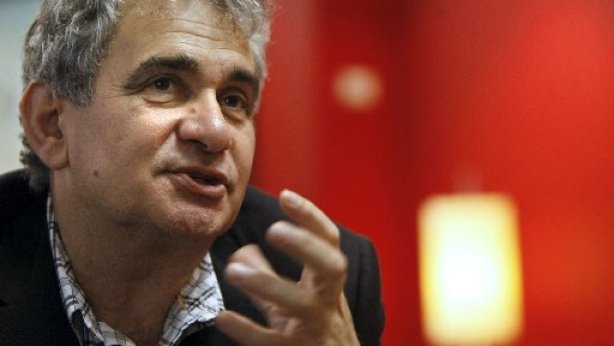basque heritage worldwide

06/22/2012

ADVERTISING
Oxford, England. In his talk entitled, “Surfaces of Basque Literature,” Bernardo Atxaga concentrated on the different names given to the Basque Country throughout history such as Euskal Herria or Euzkadi, Euskadi… and the ideological aspects of them. He recalled that the writer Robert Williams wrote, not that long ago, that “any reference to the origin or nature of the Basques is extremely political in nature.” And wondered how all this affects literature, how something of such caliber affects to the Basque writer.
Atxaga assured that “the first thing that a Basque writer has to confront is the question 'Why do you write in such a small language?' The question comes often affected by a supposed literary unviability of Euskera.” Nevertheless, in his opinion “it doesn’t matter that a writer’s language be a minority one, since there exists the device called translation that puts whatever language in the world.”
He recalled, by way of example, that two of the relevant International Foreign Literature Prize finalists are writers of literature in as minority languages such as Icelandic or Euskera (the writer Victoria Cribb and himself Bernardo Atxaga).
On the world map of Beatus of Liebana, said the writer, places are not at the place where we know them; moreover, biblical sites have an essential role: "the map is a representation commensurate with their value, and so prominent places are those connected with the life of Jesus. It is the story that puts them in an upper region on the map. Today, he said, "it would be places like New York the ones that would occupy the preeminent place."
The Basque Country, said Atxaga, didn’t have a place of story of value until the 19 century. There had been previous mentions by Strabo, and notable works such as Axular's Gero, but there lacked a force to support that story. Enlightenment proved to be a force fatal for the Basque language. With romanticism, however, minority languages of peoples like ours, obtained a story that gave them value.
He used the well-known words of Herder talking about linguistic diversity and culture in Europe as well as the contributions of Humboldt, to whom the Basque language and culture owe much. Towards the end of the 19 century, he continued, Basque nationalism constructed a new story of value for our culture and our language. Atxaga concluded his presentation by assuring that the crisis and insecurity in which the Basque culture has lived for centuries has precisely been an incentive for Basque writers.
Basque at the XV Forum for Iberian Studies
The program of the XV Forum for Iberian Studies and the selection of presenters was done by the organizing committee comprised of readers of Catalan, Galician, Portuguese, and Spanish at the University of Oxford and the Basque lecturer from the Etxepare Basque Insittute in Birmingham, Xabi Paya.
Eighteen Basque researches were part of this selection;
sixteen of them are talking about Basque topics and six will present in the
Basque language, with the collaboration of interpreter Idoia Noble. Following the inauguration on Wednesday, the
program continued yesterday and today.
BASQUE PRESENTERS AND THEIR TALKS
June 21
-Nekane Parejo: El otro “Poniente.” El flujo migratorio en el cine español
-Mari Jose Olaziregi: The Emigration as a Sympton, or On The Representation
of Emigration in Basque Literature
-Itziar Azpeitia Iruretagoiena: Euskal Telebista (Telebista Publikoa,
Autonomikoa). Kultur identitatea, programazioa eta programak. Entretenimendu
formatuak
-Marian Gonzalez Abrisketa: La construcción de la identidad nacional en los
informativos televisivos. Un estudio conparativo de las noticias en TVE y ETB
en campaña electoral
-Amaia Nerekan & Estitxu Garai: Euskarazko dokumentala: euskal talde nortasunaren
isla
-Beatriz Zabalondo: “Basque” izatearen garrantzia Edo Euskararik gabeko
identitate sozialaren eraikitze estetikoa
-Amaia Alvarez Uria: Nekane eta Axun. Euskaldunen armairuak zabaltzen
-Josu Amezaga: Komunikazio espazio nazionalak eta migrariak
-Lourdes Otaegi: Identidades Nacionales en la Intersección: Literatura y
Medios Audiovisuales
-Xabier Paya: Impovissed communities: National Identity in Basque Oral
Literature
-Iker Arranz: Joseba Sarrionaindia´s “Moroak gara behelaino artean?” and the
Foundation of Universalism in Alain Badiou
-Iratxe Martin Esparza: Identidade likidoa eta erresistentzia-postmodernismoa
Ixiar Rozasen poetikan
June 22
-Oscar Alvarez-Gila: The Image of Basque Immigration in American Cinema,
1916-2011
-Ibai Atutxa: How to Create the Sefl as other : a genealogy of Basque Identity.
Construction through the Alien Word
-Izaro Arroita Azkarate: The convergence of conflicted memories in Basque
novels
-Ur Apalategi: Basque identity, otherness and narcisistic enjoyment in
“Rosseti´s Obsession” by Ramon Saizarbitoria
-Miren Gabantxo-Uriagereka: “Cartas de amor de una monja” (Grau, 1978), la
versión española de un cineasta trangresor. Un caso de dialogo entre literatura
y cine
-Larraitz Ariznabarreta Garabieta: Without exile who am I ? Metaphors of
Basque Exile and discursive traces of subalternity in the work of Martin Ugalde
ADVERTISING
ADVERTISING
ADVERTISING
ADVERTISING
ADVERTISING
© 2014 - 2019 Basque Heritage Elkartea
Bera Bera 73
20009 Donostia / San Sebastián
Tel: (+34) 943 316170
Email: info@euskalkultura.eus